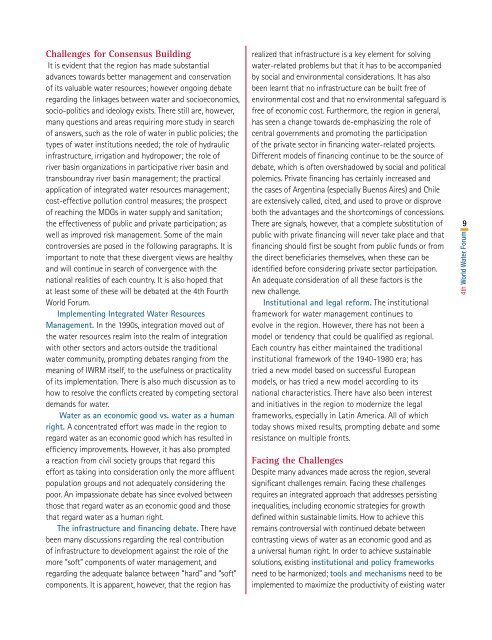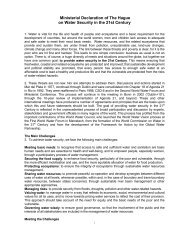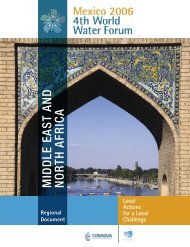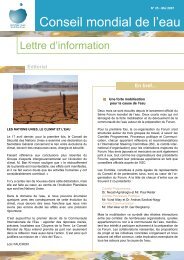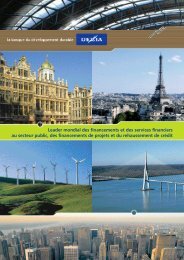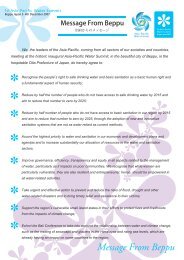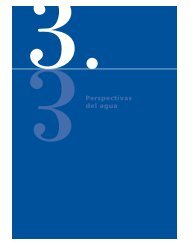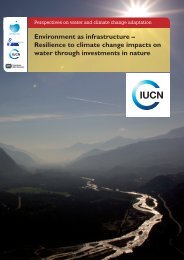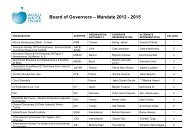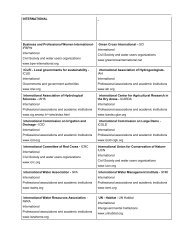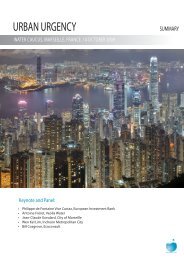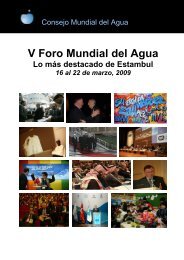Americas ok.indd - World Water Council
Americas ok.indd - World Water Council
Americas ok.indd - World Water Council
You also want an ePaper? Increase the reach of your titles
YUMPU automatically turns print PDFs into web optimized ePapers that Google loves.
94th <strong>World</strong> <strong>Water</strong> ForumChallenges for Consensus BuildingIt is evident that the region has made substantialadvances towards better management and conservationof its valuable water resources; however ongoing debateregarding the linkages between water and socioeconomics,socio-politics and ideology exists. There still are, however,many questions and areas requiring more study in searchof answers, such as the role of water in public policies; thetypes of water institutions needed; the role of hydraulicinfrastructure, irrigation and hydropower; the role ofriver basin organizations in participative river basin andtransboundray river basin management; the practicalapplication of integrated water resources management;cost-effective pollution control measures; the prospectof reaching the MDGs in water supply and sanitation;the effectiveness of public and private participation; aswell as improved risk management. Some of the maincontroversies are posed in the following paragraphs. It isimportant to note that these divergent views are healthyand will continue in search of convergence with thenational realities of each country. It is also hoped thatat least some of these will be debated at the 4th Fourth<strong>World</strong> Forum.Implementing Integrated <strong>Water</strong> ResourcesManagement. In the 1990s, integration moved out ofthe water resources realm into the realm of integrationwith other sectors and actors outside the traditionalwater community, prompting debates ranging from themeaning of IWRM itself, to the usefulness or practicalityof its implementation. There is also much discussion as tohow to resolve the conflicts created by competing sectoraldemands for water.<strong>Water</strong> as an economic good vs. water as a humanright. A concentrated effort was made in the region toregard water as an economic good which has resulted inefficiency improvements. However, it has also prompteda reaction from civil society groups that regard thiseffort as taking into consideration only the more affluentpopulation groups and not adequately considering thepoor. An impassionate debate has since evolved betweenthose that regard water as an economic good and thosethat regard water as a human right.The infrastructure and financing debate. There havebeen many discussions regarding the real contributionof infrastructure to development against the role of themore “soft” components of water management, andregarding the adequate balance between “hard” and “soft”components. It is apparent, however, that the region hasrealized that infrastructure is a key element for solvingwater-related problems but that it has to be accompaniedby social and environmental considerations. It has alsobeen learnt that no infrastructure can be built free ofenvironmental cost and that no environmental safeguard isfree of economic cost. Furthermore, the region in general,has seen a change towards de-emphasizing the role ofcentral governments and promoting the participationof the private sector in financing water-related projects.Different models of financing continue to be the source ofdebate, which is often overshadowed by social and politicalpolemics. Private financing has certainly increased andthe cases of Argentina (especially Buenos Aires) and Chileare extensively called, cited, and used to prove or disproveboth the advantages and the shortcomings of concessions.There are signals, however, that a complete substitution ofpublic with private financing will never take place and thatfinancing should first be sought from public funds or fromthe direct beneficiaries themselves, when these can beidentified before considering private sector participation.An adequate consideration of all these factors is thenew challenge.Institutional and legal reform. The institutionalframework for water management continues toevolve in the region. However, there has not been amodel or tendency that could be qualified as regional.Each country has either maintained the traditionalinstitutional framework of the 1940-1980 era; hastried a new model based on successful Europeanmodels, or has tried a new model according to itsnational characteristics. There have also been interestand initiatives in the region to modernize the legalframeworks, especially in Latin America. All of whichtoday shows mixed results, prompting debate and someresistance on multiple fronts.Facing the ChallengesDespite many advances made across the region, severalsignificant challenges remain. Facing these challengesrequires an integrated approach that addresses persistinginequalities, including economic strategies for growthdefined within sustainable limits. How to achieve thisremains controversial with continued debate betweencontrasting views of water as an economic good and asa universal human right. In order to achieve sustainablesolutions, existing institutional and policy frameworksneed to be harmonized; tools and mechanisms need to beimplemented to maximize the productivity of existing water


